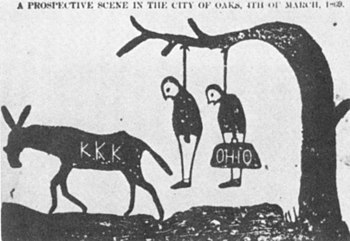
In United States history, scalawag (sometimes spelled scallawag or scallywag) was a pejorative slur referred to white Southerners who supported Reconstruction policies and efforts after the conclusion of the American Civil War.
As with the term carpetbagger, the word has a long history of use as a slur in Southern partisan debates. The post-Civil War opponents of the scalawags claimed they were disloyal to traditional values and white supremacy.[1] Scalawags were particularly hated by 1860s–1870s Southern Democrats, who called Scalawags traitors to their region, which was long known for its widespread chattel slavery of Black people. Before the American Civil War, most Scalawags had opposed southern states' declared secession from the United States to form the Confederate States of America.[2]
The term is commonly used in historical studies as a descriptor of Reconstruction Era, Southern white Republicans, although some historians have discarded the term due to its history of pejorative use.[3]
- ^ Ted Tunnell. 2006. Creating "The Propaganda of History": Southern Editors and the Origins of "Carpetbagger and Scalawag". The Journal of Southern History, Vol. 72, No. 4 (Nov., 2006), pp. 789–822
- ^ David Emory Shi, "American: A Narrative History Vol. 1 11th Edition." (2019): 753-54
- ^ Jack P. Maddex. "More Facts of Reconstruction The Day of the Carpetbagger: Republican Reconstruction in Mississippi. by William C. Harris Jr." Reviews in American History, Vol. 8, No. 1 (Mar., 1980), pp. 69–73